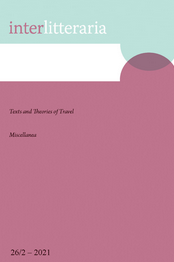Voir ce que je vois, voir ce que je m’attends à voir : degré zéro de l’écriture du voyage et écriture littéraire du voyage. En citant Henri Michaux et Michel Butor
To see what I expect to see: travel writing's degree zero and literary travel narratives. With references to Henri Michaux and Michel Butor
Author(s): Jean BessièreSubject(s): Comparative Study of Literature, French Literature, Phenomenology, Theory of Literature
Published by: Tartu Ülikooli Kirjastus
Keywords: Blaise Cendrars; Michel Butor; travel; literary writing; intentionality; questioning;
Summary/Abstract: This essay examines what arguments can be put forward to explain why readers and critics view travel writing as literary. It offers an answer that does not imply any coded definition of literature and literary works: literary travel writing is the mimesis of the questioning which characterises any literary work. This questioning rests on: 1. The duality of travellers’ perceptions of the foreign lands they discover. They see what they see and what they expect to see; their perceptions are mediated and unmediated, and consequently reflexive and congruent with the cognitive undecipherability of the foreign lands. 2. The paradox of the situation of the traveller/writer. Abroad, the traveller is not viewed as a foreigner; the least difference he/she embodies highlights a paradoxical cognitive undecipherability. The effect of the auctorial enunciation is limited by this paradox. 3. The reflexive construction of the piece of travel writing. Because they bar any meta-description of the foreign land and its people, the duality of perceptions and the traveller’s paradox make the evocations of places and people at once autonomous and implicitly related. 4. The behaviourist approach to the people of the foreign land(s). These restrictions to the traveller’s power to interpret makes the behaviourist approach obligatory. People of foreign lands can be viewed as objective entities. 5. The implicit inferences that human objective entities motivate and suggest an overall questioning. These critical and theoretical views utilise references to Michaux’s and Butor’s travels abroad and their travel writing.
Journal: Interlitteraria
- Issue Year: XXVI/2021
- Issue No: 2
- Page Range: 359-372
- Page Count: 14
- Language: French

